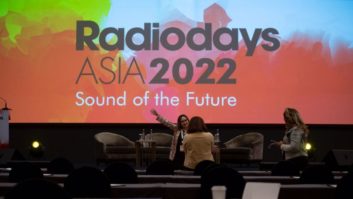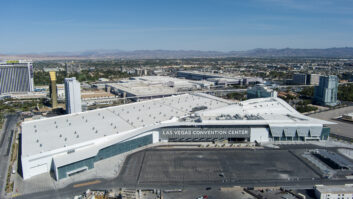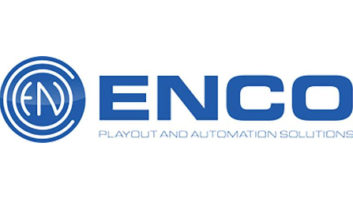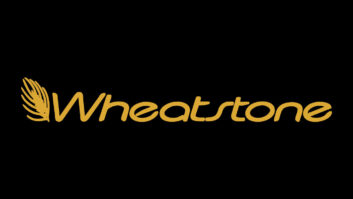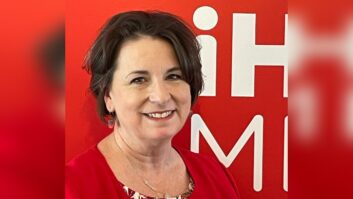With the Help of Louisiana Public Broadcasting, Station Is Back on the Air After Katrina’s Wrath
(click thumbnail)David Freedman
The WWOZ(FM) music library represents nothing less than an audio history of the unique roots music heritage of New Orleans. That history was almost wiped out by Hurricane Katrina.
On the morning of Aug. 29, 2005, the storm slammed into the Gulf Coast, still a monster at Category 4 strength. WWOZ, a public station in the fabled Treme section of the city, sustained a lot of water damage.
Tucked away on the second floor of the station’s Armstrong Park headquarters was a rich repository of albums and CDs. Other historic 78 rpm records, DAT tapes and reel-to-reel recordings of live concerts were stored off-site. Combined, these archives represented the history of the indigenous music of the region.
“We had a 30-foot-by-30-foot section of our roof tiles blow off,” said General Manager David Freedman. “The tar paper held, but the whole collection was exposed to rain, so we put visquene on the roof. The city wouldn’t give us a permit to re-enter New Orleans, so we had to use ‘unorthodox methods’ to squire our roofer into town.
“Eventually we saved our 25,000 CDs and other recordings, which now safely reside temporarily with Louisiana Public Broadcasting and in the Louisiana State Archives in the state capital of Baton Rouge.” Roughly eight months after Katrina, fewer than half of the city residents had returned and only 60 percent of the volunteer on-air staff were back in New Orleans.
Operating in triage mode
Getting the station returned to the airwaves was the first problem.
“Our studio took on some water, but the main thing is that we had no electricity,” said Freedman. “We had mold in the building, we couldn’t get mail and New Orleans was like a third-world environment. All the things we took for granted weren’t there.”
Freedman looked to Baton Rouge, about 80 miles away, where Louisiana Public Radio generously provided space in their facility for a temporary studio.
At first WWOZ – a Class A station operating at 4,000 watts on 90.7 MHz – came back to life with the help of Ken Freedman, the general manager of WFMU(FM), Jersey City, a sister community radio station but no relation to David. Drawing on WFMU’s extensive MP3 files of New Orleans-based music, airchecks sent in by WWOZ fans around the country and announcements recorded over the phone by David Freedman, “WWOZ in Exile” was on the Internet within five days of the disaster.
Soon WWOZ began to send its own local programming via satellite from Baton Rouge to the transmitter site in New Orleans. But the transmitter was perched atop a 25-story building on Canal Street that still had no power.
“That meant we had to run a very long extension cord from the roof to the generator on the ground, ” said Freedman. “That was dicey because every 10 days we’d have to service it and there were no working elevators so our engineer would have to walk up 25 stories to reboot. Sometimes there were high winds so our dish got blown askew and that would knock us off the air. Meanwhile, the building was still surrounded by toxic, bacteria-laden waters.”
The station engineer is Damond Jacob; he’s been with WWOZ for about 11 years and is a master musician and recording engineer. Freedman said Jacob played an essential role in the station’s survival.
“We had a team of engineers including one from the NPR affiliate in town, our consulting engineer Tony Guillory and a few others. We had a ‘think tank.’ Damond was the chairman of the think tank and brought it all together.
“We do a lot of live recording and anyone who has done that work knows that it’s treacherous because there are so many things that can go wrong. Damond has been one of those guys you want to have in the trenches no matter what you’re faced with,” he said.
Antedeluvian
The station broadcast in fits and starts until VoodooFest, a local music festival held at Halloween. VoodooFest was moved to Memphis after the flood but event organizer Steven Rehage opted to bring one day of the show back to New Orleans. True to its mission, come hell and high water, WWOZ was there to broadcast the event live.
“The event always takes place in New Orleans, and the producers couldn’t do a for-profit in New Orleans after the hurricane; so it was mostly held in Memphis,” said David Freedman. “They still decided to throw a one-day event in New Orleans, but they lost money and did it for the city and for the relief workers so they would still have a festival.
“It was very important because things were so grim and we needed a reminder of what life used to be like before the flood,” he said.
“You have to give credit to the festival organizers because it was not good for them economically to produce VoodooFest in New Orleans,” Freedman said. “But it was a great morale booster for the people of our town. It buoyed everyone up.”
The station had lost its remote truck in the flood, but Louisiana Public Broadcasting helped get them back on the air and the Corporation for Public Broadcasting sent them enough money to get by.
“Louisiana Public Broadcasting opened their arms to us and gave us great support in engineering, studio space and financial help, too,” said Freedman.
On Dec. 12, Freedman finally was able to move his studio back to New Orleans, though not into the original building, which remained without electricity (and still has no power as of press time). He found a temporary home in an office building in the heart of the Vieux Carre at the French Market, overlooking the Mississippi River.
Financially, the station is getting back its footing.
“We lost about $250,000 in a fall membership drive. We lost $200,000 in equipment. It was around $35,000 for all the relocation and moving stuff around,” said Freedman. “Since then we’ve offset those losses in the fund drives. We’re still waiting to hear from our insurance company on equipment. We think we’ll get an adjustment on that.”
During Mardi Gras in March, the first flicker of tourism since the previous summer was noticed.
Preserving the music
Technical issues aside, the question of what to do with the massive local-music archive lingered.
“Since 1993 we have been recording performances at events and venues such as the New Orleans Jazz and Heritage Festival, Satchmofest, ZydecoFest and others. We have over 3,000 hours of live musical performances,” said Freeman.
“But getting the masters out of harm’s way was not the same as preserving future loss. All this material must be transferred to another medium, logged and made accessible.”
WWOZ on the Air“Regarding automation, we were using an OMT iMediaTouch,” says engineer Damond Jacob of the station’s current equipment situation. “We’re currently not using any automation. It has been down since Katrina. We use a used Audioarts console, manufactured by Wheatstone; we use a Moseley SL9003Q Starlink STL.
“We have to replace our antenna [the station was in the process of doing so of press time]. Shively is the old one, a three-bay antenna. We’re replacing it with the same and changing the transmission lines as well.”
The station feeds its signal from a temporary studio via the Moseley STL to a Broadcast Electronics 6 kW transmitter.
“Our mobile studio truck has a complete 48-track digital recording studio for concerts. We use an Alesis HD system for tracking (recording), then dump to Pro Tools to edit. The original truck didn’t survive the storm. It was lost and we recently acquired a new one.”
To that end Freedman put together a preliminary grant proposal for the Grammy Foundation, which funds preservation work. He believes money will be made available for this cause. The Grammy organization flew him out to Los Angeles for an event called “New Orleans Rising,” which featured New Orleans talent.
“An outstanding group of people in music archiving and engineering is helping. The price of restoring all this music to a digital format may run to $500,000,” said Freedman. “So on top of rebuilding our station, keeping our operations on firm financial footing and providing community information, we have this project too.”
Freedman said the flood was a wake-up call that all broadcasters should heed.
“We knew in our bones we had to digitize, but this just pushed us ahead of the rest of the country,” he said. “Next time we have a hurricane we won’t have to grab our entire collection. We can just grab a handful of hard drives and head out of Dodge.”
The storm also forced other changes in the station.
Internet tail wags the dog
Freedman kept his Internet presence at www.wwoz.org , and that helped the station raise over $500,000 in contributions in a recent pledge drive.
“Most radio stations have a Web site,” he said. “In the future, most Web sites will have a radio station. The majority of our audience now hears us via live streaming. We are no longer a traditional community station because the New Orleans community can now be anywhere, including outside our broadcast coverage area.”
He also re-thought the concept of newscasts.
“Why should we make appointments for people to tune in the news?” said Freedman. “Our reporters come in when they have information. We produce segments that last three to seven minutes and deal with one issue at a time. We see these features as a way to drive people to the Web site, where more information can be found.”
While Arbitron had to skip surveys in New Orleans, Internet hits remained measurable; and they are increasing.
“Via the Internet, our ‘community’ listeners may now be in Brisbane, Australia or Chalmette, a town below New Orleans that was almost entirely wiped out,” said Freeman. “This is a cautionary tale for Internet broadcasters. People in radio need to think about what they can provide that is unique. They should think about what community they’re going to serve around the globe.”
Freedman is still concerned that a large number of local musicians as well as the population at large have moved away from New Orleans forever.
“It’s not just about building our community radio station,” he said. “We are now faced with rebuilding the very community served by WWOZ. We have to renew, reinvent or restore the lines of cultural transmission in this city. We have to make sure New Orleans does not lose its soul.”






